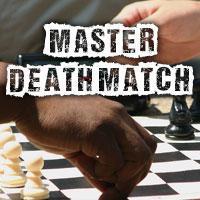
Zherebukh Wins Death Match 14!
Zherebukh Wins Battle of Lubbock in Death Match 14!
Texas Tech freshman GM Yaroslav Zherebukh started well and fended off a late surge to edge his more experienced teammate GM Elshan Maradiabadi in Death Match 14. Thanks to several early resignations, the two Knight Raiders played 35 games, the second most ever, with Zherebukh winning 19.5-15.5.

GM Yaroslav Zherebukh, Death Match 14 winner
Zherebukh correctly predicted that the opening hour would be his best. He won the 5+1 portion 6-3, although the first two games were shaky. In the pre-match interview, he looked tired, and he said his main preparation was simply to rest. "I had a pretty tough day at school with finals," Zherebukh said.
Moradiabadi played well and convincingly won a couple of games to take a 2-0 advantage, his only lead of the match. "I had to have some warming up," Zherebukh said. "When I started to lose, I realized I had to concentrate more. I was too relaxed. Usually I'm not good in the opening or in the start of the match."
After falling behind, Zherebukh would not drop another game in the first segment, winning five and drawing two to take a three-game lead. His crispest win (game three) was also his first. The queen's rook climbed the stairs, reaching d6 and becoming inviolate. Moradiabadi resigned rather than submit to the inglorious 17...Ng8, when the knight on d7 will be mercilessly attacked.
Moradiabadi played offbeat systems with an early h4 or h5 in numerous games, often obtaining a substantial time advantage. He compiled early one-minute leads on the clock in more than half of the 5+1 games, but it was all for naught.
"When I have time increment, I am always safe," Zherebukh said, brushing off what commentators GM Ben Finegold and IM Danny Rensch deemed time mismanagement. "I had it in control. I had to get an advantage first. If I have one second, I will convert."
Moradiabadi admitted that he had trouble overcoming the early problems. "I'm an experienced player, but not experienced enough to handle it," he said. "I tried to complicate things, but I forgot that he's a strong player!"

GM Elshan Moradiabadi
Moradiabadi stabilized the damage after the transition to 3+1 games. He drew four of the first five matches before getting a win in game 15, when Zherebukh opened with 1. b3!? The Ukrainian grandmaster used the opening several more times later in the match, without much success. "I just wanted to play more interesting," Zherebukh said. "I'm too bored to play the same game after game."
Fireworks flew in the next game. In one of the few mainline openings of the Death Match, Moradiabadi played a suspicious rook lift, nearly lost the piece, got a better position, then erred with 18. g5? Giving away the f5 square meant sacrificing his queen, but he generated substantial counterplay, and could have had better chances if something like 32. Nb1, stopping the mating net. As it turned out, Zherebukh's geometric queen and bishop motif could not be parried (34. Ke4 would still be mate in two after 34...Qe3+).
Moradiabadi got a win in the following game to even the segment at 4.5-4.5, but could not dent his three-game deficit going into the bullet segment.
Zherebukh began by winning three consecutive 1+1 games, making his lead six games, the largest of the match. "You never know about one-minute; it's a lot of luck," Zherebukh said. But Moradiabadi made a striking comeback, winning five straight. "At some point I started to feel confident," Zherebukh said. "That's why I lost five games in a row. I played like a beginner."
Now nursing only a one-game lead, Moradiabadi missed a few golden chances in game 27 to climb all the way back to level. Late in the game it looked the pieces had been dropped from a helicopter. Both kings were on the precipice of being mated, and Moradiabadi's failure to convert ended the momentum and the comeback attempt.
With the clock ticking down, he missed 33...Rf1+, which is forced mate after 34. Kxf1 Qxh3+ 35. Ke1 Qh1+ 36. Kf2 Qg2+ 37. Ke1 Qe2#. Zherebukh then returned the favor, overlooking 36. Nf8+, which is mate in two more moves, but he got the messy win anyway.
We hope everyone enjoyed IM Danny Rensch and GM Ben Finegold's coverage of the match on Chess.com/TV! If you missed the show, go to Chess.com/TV and click the "videos tab" to see the recorded replay. Don't miss Blitz Death Match 15, on June 9th, where GMs Fabiano Caruana and Valeriy Aveskulov will face off for the $1,000 cash prize.


